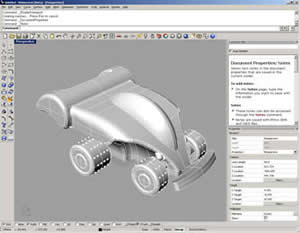- Join our Team
- Resources
-
Account
- |
- Cart
- EN FR
McNeel is using Datakit's technology in Rhino 4.0

October 01, 06
McNeel and Datakit recently worked together to develop a data exchange solution between SolidWorks and Rhino 4.0, based on Datakit's topological model. This interface, finalized early in September, has already been integrated into the beta version of Rhino 4.0, now downloadable by users of Rhino 2 or Rhino 3 from McNeel's Web site.
For both companies the collaboration has been a complete success. The product works very well, and both teams enjoyed working together.
Lowell Walmsley, data exchange manager at McNeel, travelled from Seattle to spend a few days with the Datakit development team, and more particularly to work alongside Laurent Eraud, Datakit's Rhino V3 plug-in specialist. Walmsley explained, "I don't often travel for projects like this, but the time frame for the release of the final version was tight. Working side by side with Datakit to find solutions to the problems as they occurred helped us to progress very quickly."
Datakit has been offering Rhinoceros V3 plug-ins for most CAD software for several years and has gained recognition within the Rhino community. Its products, which have capabilities for reading native formats, are distributed through a worldwide dealer network.
McNeel's decision to integrate a SolidWorks converter based on the Datakit platform addressed a number of strategic and technical requirements.
Walmsley explains, "We entered into a partnership with SolidWorks to facilitate data exchange and interoperability between the two software products. We wanted to develop a solution that would read Rhino surfaces in SolidWorks, which we did, but then in order to provide more complete interoperability, we wanted to offer a solution that would read native SolidWorks files into Rhino V4. We knew about Datakit's experience, and that's why we contacted them to develop a Rhino V4 plug-in that would read SolidWorks geometry. Rhino has a great reputation for data exchange. We were looking for a tool that would be both fast and precise, would work like the other conversion solutions we have in Rhino, and would deliver the seamless usability that matters a lot to our customers."
Laurent Eraud, Datakit's Rhino specialist, adds, "To be able to deliver 100% efficiency we found solutions for all the cases we encountered, including some that occur rarely but that could be a real obstacle for users; for example, when the SolidWorks model was originally imported and is flawed. Sharing an office enabled us to think things through together and look for solutions that would really address the way Rhino users work together in the real world."
Lowell Walmsley looks back on the work accomplished at Datakit, "This was a satisfying experience on a technical level. The interface is up and running, it meets our expectations, and we have rolled it out on schedule. I have also learned about the way Datakit does things. The teamwork is great; everyone contributes his individual skills to the whole group."
Working at Datakit was good. Probably one of the keys to its success !